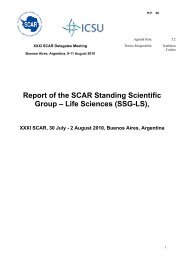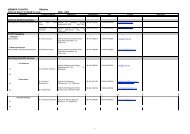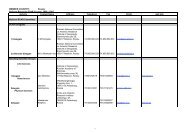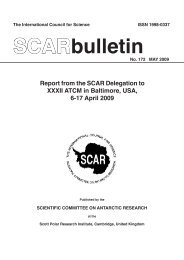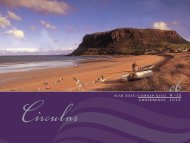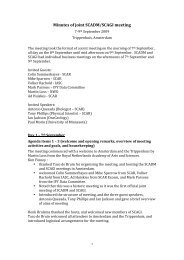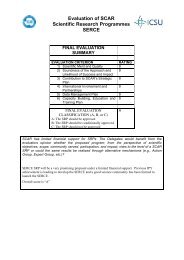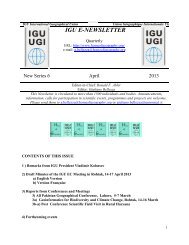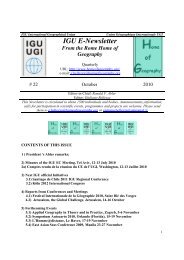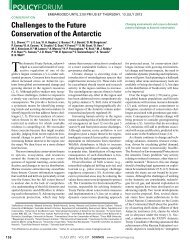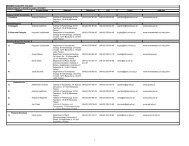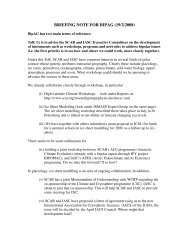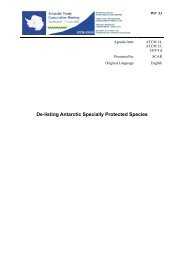Download CAREX Newsletter #1 - carex-eu.org
Download CAREX Newsletter #1 - carex-eu.org
Download CAREX Newsletter #1 - carex-eu.org
You also want an ePaper? Increase the reach of your titles
YUMPU automatically turns print PDFs into web optimized ePapers that Google loves.
<strong>CAREX</strong> <strong>Newsletter</strong><br />
Coordination Action for Research Activities on life in Extreme Environments<br />
> Issue 1• May 2008<br />
> Editorial<br />
A European Platform for research on life in extreme<br />
environments<br />
With the official start of the <strong>CAREX</strong> project<br />
on January 1st, 2008, the European<br />
scientific community involved in research<br />
on life in extreme environments now has<br />
the basis for a platform and a framework<br />
to exchange, interact, share expertise and<br />
undertake a common reflection on future research priorities<br />
in the field.<br />
<strong>CAREX</strong> is an ambitious project supported by the European<br />
Commission for three years (2008-2010) under<br />
the Seventh Framework programme (FP7). It builds on<br />
the recommendations that emerged from the European<br />
Science Foundation’s recent Investigating Life in Extreme<br />
Environments (ILEE) initiative. It aims at identifying<br />
and consolidating the European scientific community<br />
involved in research on life in extreme environments<br />
around common research priorities and interactive<br />
communication tools, hopefully setting the scene<br />
for future research programmes funded at national and<br />
international levels.<br />
Compartmentalisation and lack of communication between<br />
disciplines and their associated technological<br />
developments are seen as major hurdles and this is of<br />
particular relevance when considering scientific and<br />
technological activities in extreme environments where<br />
no substantial community is yet recognised. Interdisciplinarity<br />
and multidisciplinarity have to be major drivers<br />
for future scientific achievements in extreme environments.<br />
<strong>CAREX</strong> firmly endorses this view and aims to<br />
support research interests across microbes, plants and<br />
animals evolving in diverse marine, polar, and terrestrial<br />
extreme environments as well as in outer space. It will<br />
also provide the opportunity for its stakeholders to<br />
develop more targeted initiatives where specific disciplinary<br />
issues may arise. In such cases, <strong>CAREX</strong> Project<br />
1<br />
Office can and will provide help with coordination and<br />
logistical support.<br />
<strong>CAREX</strong> involves a group of nine core partners (details<br />
p. 4) contractually responsible for the project developments.<br />
It also involves over 50 European and non-<br />
European Associated Partners and Observers, in all<br />
representing 23 countries, and these form the backbone<br />
of a wide European network in the field of life in<br />
extreme environments research.<br />
With the support and involvement of its community<br />
and the commitment of its core partners, I am confident<br />
that <strong>CAREX</strong> will successfully implement its ambitious<br />
work programme over the next three years and<br />
develop a strong European foundation for future research<br />
activities in extreme environments that will<br />
probe the limits for life both on and off this planet and<br />
the lessons to be learnt for fundamental biology.<br />
> Inside this issue<br />
Dr. Cynan Ellis-Evans<br />
<strong>CAREX</strong> Coordinator<br />
• Editorial 1<br />
• <strong>CAREX</strong> Kicked-off 2<br />
• <strong>CAREX</strong> Call for Transfer of Knowledge Grants 2<br />
• <strong>CAREX</strong> Website and Databases 3<br />
• <strong>CAREX</strong> Workshops Announcement 3<br />
• Information from <strong>CAREX</strong> Associated Partners<br />
and Observers<br />
• <strong>CAREX</strong> Core Partners 4<br />
4
<strong>CAREX</strong> Kicked-off<br />
British Antarctic Survey, 18 March 2008<br />
<strong>CAREX</strong> was inaugurated on March 18th in the British<br />
Antarctic Survey Offices (Cambridge, UK), 42 European<br />
and North American experts attended the event,<br />
mostly Associated Partners and Observers.<br />
This meeting provided the opportunity to present the<br />
project’s structure, approach, objectives and action<br />
lines in detail and to get valuable feedbacks and inputs<br />
from the audience. Furthermore, in order to illustrate<br />
the wide spectrum of disciplines relevant to research<br />
on life at the limits, a keynote speech and five thematic<br />
presentations were given:<br />
• Polar Environments (Prof. Guido di Prisco)<br />
• Extreme Terrestrial Environments (Prof. Ricardo Amils)<br />
• Space Environments and Outer Space Bodies (Dr. Petra<br />
Rettberg)<br />
Besides presentation of the project and the research<br />
challenges in these various environments, and addressing<br />
the specificities of extreme environments, this<br />
meeting also provided a forum where issues such as<br />
networking of scientists, exchange of best practices and<br />
identification of research priorities were extensively<br />
discussed. These lively discussions and exchanges supported<br />
the relevance of <strong>CAREX</strong>’s objectives and illustrated<br />
the expectation of the European and international<br />
scientific community. This augurs well for the future<br />
of the <strong>CAREX</strong> initiative and the Steering Committee<br />
warmly thanks the participants for their enthusiastic<br />
contributions and participation.<br />
All the presentations given at the Kick Off meeting are<br />
downloadable on the <strong>CAREX</strong> website:<br />
www.<strong>carex</strong>-<strong>eu</strong>.<strong>org</strong>.<br />
• Investigating Life in Extreme Environments – Approaching<br />
the issue, its boundaries and challenges (Prof.<br />
Charles Cockell – Keynote speech)<br />
• Extreme Marine Environments (Dr. Nadine Le Bris)<br />
> <strong>CAREX</strong> call for Transfer of Knowledge Grants<br />
On May 2 nd , <strong>CAREX</strong> opened its first call for Transfer of Knowledge grants<br />
One of the <strong>CAREX</strong> objectives is to promote knowledge<br />
transfer across the life in extreme environments<br />
scientific community and to encourage harmonisation<br />
of protocols and approaches. An important component<br />
of this objective will be Calls for proposals for<br />
individual transfer of knowledge grants to which CA-<br />
REX will contribute up to 1,200 Euros.<br />
The primary aim of these grants is to give young researchers<br />
the opportunity to gain knowledge in the use<br />
of technologies and/or methodologies specific to life in<br />
extreme environments research. Grants can be either<br />
used: i) to provide short secondments of young researchers<br />
to a life in extreme environments research group<br />
as a visiting scientist, or ii) to support the invitation of<br />
a specialist from an advanced life in extreme environments-related<br />
technology field to make presentations<br />
at an institution. In the latter case the application must<br />
be presented by the institute hosting the seminar/<br />
course, clearly explaining the educational purpose of<br />
the initiative and the target audience.<br />
This first Call is restricted to early career scientists<br />
(within nine years after PhD) working in <strong>CAREX</strong> partner<br />
institutions. The deadline for submission is June 30,<br />
2008. For more information and submission, see<br />
www.<strong>carex</strong>-<strong>eu</strong>.<strong>org</strong> and/or contact Nicolas Walter<br />
(nwalter@esf.<strong>org</strong>).<br />
2
<strong>CAREX</strong> Website and Databases<br />
Key elements towards <strong>CAREX</strong> Achievements<br />
<strong>CAREX</strong> aims at providing the scientific community involved<br />
in life in extreme environments research with an<br />
interactive platform that will be a focus for information<br />
on the project and on extreme environment research.<br />
It will target not only the research community but also<br />
funding agencies, decision makers and the general public.<br />
It will also gather and make available information<br />
relevant to the field for research news, funding opportunities,<br />
job opportunities or event announcements.<br />
Furthermore, in order to provide an efficient contact<br />
and networking facility to the community, the CA-<br />
REX website will host a set of three open access<br />
databases gathering information on experts, projects<br />
and infrastructures. These databases will be structured<br />
around three main dimensions:<br />
> <strong>CAREX</strong> Workshops Annoucement<br />
30 November - 5 December 2008<br />
Sant-Feliu de Guixols, Spain<br />
Addressing the recommendations emerging from the<br />
ESF-ILEE initiative, <strong>CAREX</strong> will <strong>org</strong>anise a series of<br />
three workshops on model ecosystems, model <strong>org</strong>anisms<br />
and enabling technologies. These workshops will<br />
aim at identifying strategic research priorities and establishing<br />
a research agenda in the field of life in extreme<br />
environments research.<br />
The first two workshops will consider the Identification<br />
of model ecosystems in extreme environments<br />
(30 November – 2 December 2008) and Priorities for<br />
environment-specific technological developments<br />
and infrastructures (3-5 December 2008). Both<br />
workshops will be held in Sant-Feliu de Guixols, Spain<br />
(north of Barcelona).<br />
The “model ecosystem“ workshop will focus on identifying<br />
key extreme environments and the potential for<br />
applying an ecosystem-based approach. Ecosystembased<br />
approaches can provide unique insights to ecosystem<br />
functioning and the response to environmental<br />
changes, whilst contributing to understanding of broader<br />
biological and ecological issues such as those related<br />
to the evolution of life on early Earth. This is a challenging<br />
approach to investigate the interaction of extremophile<br />
<strong>org</strong>anisms with their environment and associated<br />
communities. It will require interdisciplinarity and<br />
appropriate time scales in order to address both environmental<br />
and biological variability.<br />
3<br />
• the type of <strong>org</strong>anism considered (e.g. <strong>eu</strong>karyotes,<br />
fungi, plants and vertebrates)<br />
• the type of environment of interest (e.g. hydrothermal<br />
vents, alkaline environments, polluted areas<br />
and polar regions)<br />
• the type of stress/adaptation considered (e.g.<br />
temperature, pressure, salt concentration, radiation<br />
and chemicals)<br />
In order to find relevant experts, projects or infrastructures,<br />
the search engine associated to these databases<br />
will allow performing targeted queries as search criteria<br />
will include the type of <strong>org</strong>anism, environment or<br />
stress to be considered in the search results.<br />
Being populated by the community, these databases will<br />
be interactive collaborative tools that will allow information<br />
exchange, networking and sharing of expertise<br />
at the individual level.<br />
The current <strong>CAREX</strong> website (www.<strong>carex</strong>-<strong>eu</strong>.<strong>org</strong>.) is<br />
temporary. The final website and associated databases<br />
are under development and will be operational by mid-<br />
June 2008.<br />
Microbial, animal and plant dominated communities in<br />
polar, marine, and terrestrial environments will be<br />
considered and integration of research across different<br />
fields and disciplines will be actively encouraged.<br />
The” technology and infrastructures” workshop will be<br />
focussed on cutting-edge technologies, innovative instrumentation<br />
and key infrastructure needed to support<br />
life in extreme environments research. It will be closely<br />
linked to the model ecosystems workshop and its recommendations.<br />
Participants will examine the European<br />
capability and potential leadership in the area and will<br />
produce a set of recommendations for the enlargement<br />
of European technological capacities to study life in extreme<br />
environments.<br />
Both workshops will gather around 80 participants.<br />
Participation to these workshops will be by invitation<br />
only with <strong>CAREX</strong> Associated Partners and Observers<br />
being invited as a first priority. For more information:<br />
info@<strong>carex</strong>-<strong>eu</strong>.<strong>org</strong> .<br />
Eden Roc Hotel, Sant-Feliu de Guixols
Information from <strong>CAREX</strong> Associated Partners and Observers<br />
For announcements, opportunities or information to be published in the <strong>CAREX</strong> newsletter, please write<br />
to newsletter@<strong>carex</strong>-<strong>eu</strong>.<strong>org</strong><br />
> Ben-Gurion University - Jacob Blaustein Institutes for Desert Research (BGU – BIDR) - Israel<br />
All the infrastructures of the Blaustein Institutes for<br />
Desert Research (BIDR) are open to European scientists<br />
that wish to carry out research in arid/hyper arid<br />
regions under a special FP6 project (Dryland Research<br />
SSA).<br />
The details of this project can be found at:<br />
http://www.bgu.ac.il/BIDR/bic/ssa/index.html<br />
A general description of the activities of the BIDR can<br />
be found at:<br />
http://cmsprod.bgu.ac.il/Eng/Units/bidr/About/<br />
For more information, contact:<br />
Pr. Pedro Berliner berliner@bgumail.bgu.ac.il<br />
> <strong>CAREX</strong> Core Partners<br />
The implementation of the <strong>CAREX</strong> workprogramme falls under the responsibility of its nine Core Partners.<br />
These partners are work package and/or task leaders and sit in the project’s Steering Committee.<br />
NERC - British Antarctic Survey, UK<br />
Cynan Ellis-Evans - <strong>CAREX</strong> Coordinator (JCEL@bas.ac.uk)<br />
European Science Foundation (ESF), France<br />
Nicolas Walter - <strong>CAREX</strong> Project Manager (nwalter@esf.<strong>org</strong>)<br />
CNRS, France<br />
Daniel Pri<strong>eu</strong>r (daniel.pri<strong>eu</strong>r@univ-brest.fr)<br />
CNR – Istituto di Biologia Agro-ambientale e Forestale, Italy<br />
Francesco Loreto (francesco.loreto@ibaf.cnr.it)<br />
D<strong>eu</strong>tsche Zentrum für Luft- und Raumfahrt (DLR), Germany<br />
Petra Rettberg (petra.rettberg@dlr.de)<br />
Ifremer, France<br />
Nadine Le Bris (Nadine.Le.Bris@ifremer.fr)<br />
Institute of Botany, Academy of Sciences of the Czech Republic<br />
Josef Elster (jelster@butbn.cas.cz)<br />
MATIS – Prokaria, Iceland<br />
Viggó Marteinsson (viggo.th.marteinsson@matis.is)<br />
INTA – Centro de Astrobiología, Spain<br />
Ricardo Amils (ramils@cbm.uam.es)<br />
<strong>CAREX</strong> is supported by the European Commission’s Seventh<br />
Framework Programme (FP7)<br />
> <strong>CAREX</strong> Contact<br />
For any question or request for information concerning the <strong>CAREX</strong> project, please contact the project manager:<br />
Nicolas Walter • European Science Foundation • nwalter@esf.<strong>org</strong> • Tel: +33 (0)3 88 76 71 66<br />
4



